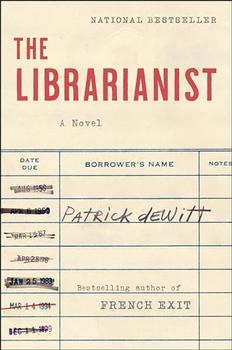Summary | Excerpt | Reviews | Beyond the Book | Readalikes | Genres & Themes | Author Bio

A Novel
by Patrick deWitt
"What do you mean by 'freaks out'?"
"It's things I can't even talk about in polite conversation. And the cops won't come unless there's a weapon involved. You know how many ways there are to freak out without a weapon? Literally one million ways."
All the time they were speaking they were watching the woman. Bob said, "I'm going to go check in with her."
"Okay, but if she starts freaking out, can you try to get her through the doors?" The cashier made a corralling gesture, arms out. "Once she's in the parking lot she's out of my domain."
Bob moved toward the figure in pink, humming benignly, both to announce his arrival and identify himself as a friend. "Oh, hello," he said, as if he just noticed her standing there. She didn't respond in any measurable way, her features hidden behind the cap and hair and sunglasses. "Is everything all right today, ma'am? Anything I can help you with?" Still no reaction, and Bob looked to the cashier, who touched his own shoulder in a gesture communicating his belief that Bob should give the woman a shake. Bob didn't shake her but rested his hand on her shoulder; the instant he made contact she became activated, like a robot coming to life, turning away from Bob and walking deliberately down the aisle and right out of the store. Bob watched her go. "What should I do now?" he asked the cashier.
"I don't know!" the cashier said. He was happy the woman was gone but also happy that something interesting had happened.
Bob said, "I'm going to follow her," and he left the store.
He walked behind the woman at a distance of ten paces, sipping his coffee, marking her meager progress. It took her full five minutes to travel one city block, at which point she became frozen again, this time at a bus stop, standing outside the glass shelter and looking in at the empty bench. It began to rain and the woman's sweat suit grew damp. When she started to shiver, Bob approached and draped his coat over her shoulders. But soon he was shivering and damp; when a police car pulled up at a red light, Bob waved to the policeman to get his attention. The policeman waved back, then drove away.
Bob moved to stand under the shelter of the bus stop, facing the woman. His coffee had gone cold in his hand and it occurred to him he hadn't paid for it. He'd decided his walk had been ruined and that he would cut his losses, forfeit the coat, and taxi home, when he noticed a laminated card hanging from a string around the woman's neck. He stepped around the shelter and, tilting her body slightly, made to inspect the card. There was a photograph of the woman, in sunglasses and cap, and beneath the photo, a text: My name is CHIP, and I live at the GAMBELL-REED SENIOR CENTER. Beneath the text there was an address, and beneath the address was the image of an imposing Craftsman home with medieval touches—a tower and weathervane, a wraparound porch.
Bob recognized the house from his walks, and he said, "I know this place. Is this where you live? Is your name Chip?" A determination rose up in him, and he decided he would deliver Chip to the address.
He took her gently by the arm, pointing her in the direction of the center. Every ten or fifteen steps she paused and groaned, but her resistance was minor, and they made their plodding advancement against the weather. She wanted to go into every storefront they passed, and so Bob had to repeatedly correct her path; each time he did this she became tense and made further groaning noises. "Sorry, Chip," he told her. "I wish we could stop and browse but they'll be worrying about you, and we don't want them to worry, do we? No, let's keep on, we're almost there."
Soon the Gambell-Reed Senior Center was in sight. Bob had walked past the property any number of times, often asking himself what it was, exactly. It stood perched on a hill, looming over its neighbors on both sides and looking very much like the cliched image of a haunted house. There was no signage announcing its function, but hospital shuttle buses and ambulances were commonly parked at the curb, and a wheelchair access path zigzagged up from the sidewalk and to the entrance. Bob led Chip up this path, studying the center as they made their ascent. It looked, he realized, quite a lot like the Hotel Elba; and while Bob took no stock in the unearthly, he couldn't help but wonder at the similarity between the properties, in connection with his dream of the same morning.
Excerpted from The Librarianist by Patrick deWitt. Copyright © 2023 by Patrick deWitt. Excerpted by permission of Ecco. All rights reserved. No part of this excerpt may be reproduced or reprinted without permission in writing from the publisher.




A library is thought in cold storage
Click Here to find out who said this, as well as discovering other famous literary quotes!
Your guide toexceptional books
BookBrowse seeks out and recommends the best in contemporary fiction and nonfiction—books that not only engage and entertain but also deepen our understanding of ourselves and the world around us.